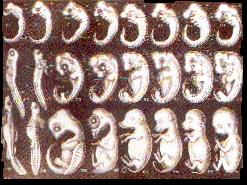 In a recent article titled: "A Simple Rule for Cultural Evolution", Samuel Arbesman gets in on the issue of whether "ontogeny recapitulates phylogeny" in cultural evolution - in the Wired science "social dimension" blog.
In a recent article titled: "A Simple Rule for Cultural Evolution", Samuel Arbesman gets in on the issue of whether "ontogeny recapitulates phylogeny" in cultural evolution - in the Wired science "social dimension" blog.Samuel starts out by calling the idea "completely wrong" in the organic realm - which seems a bit strong.
The answer Samuel gives for the cultural realm is that it's not always wrong in the case of cultural evolution - saying that "cultural ontogeny recapitulates phylogeny".
However, unfortunately, it turns out that Samuel isn't talking about cultural development processes at all! An example of a cultural development process would be where a recipe turns into a cake - i.e. memes turn into meme products. Instead, Samuel is talking about the process of acculturation - the way in which humans acquire memes during their own developmental process. Describing this process as being analogous to ontogeny in cultural evolution seems to be pretty misleading to me. That's the ontogeny associated with the human genome going on there - not a form of cultural ontogeny! I don't think that Samuel means what he says...
Anyhow, at least he is asking questions about the topic. This coverage arises from a paper by Alex Mesoudi titled Variable Cultural Acquisition Costs Constrain Cumulative Cultural Evolution - which I've previously given feedback on here.
Mesoudi doesn't make this mistake in the original article. Instead he says:
Individual ontogeny recapitulates cultural history for mathematical knowledge: children learn mathematical concepts in the same order that they were first invented historically.That seems fine to me - he's talking about an individual human child. Though as an aside we do see computer programming before calculus these days.
Does ontogeny recapitulate phylogeny in the cultural realm? Probably less so than in the organic realm. The reason ontogeny recapitulates phylogeny at all is because developmental processes build on top of prototypes without going back to refactor them out of existence. There's also layering processes in development. So, for example, the "reptilian" brain appears in mammal embryos before the neocortex does - a case of ontogeny recapitulating phylogeny. The same kind of thing happens in the cultural realm - occasionally - and it's probably a universal evolutionary process. A skyscraper starts out looking a bit like a house (which was invented first) - because it is like a house with more layers added on top. However, ontogeny probably recapitulates phylogeny less frequently in the cultural realm - because engineers are so often involved there - and they are often better than natural selection at refactoring - and eliminating the sort of signs of phylogenetic history that residual prototypes and developmental layering often depend on.










This blog entry is a gem. I'm in the beginning stages of thinking about linguistic ontogeny/phylogeny, so thank you very much for this article. Cheers!
ReplyDelete